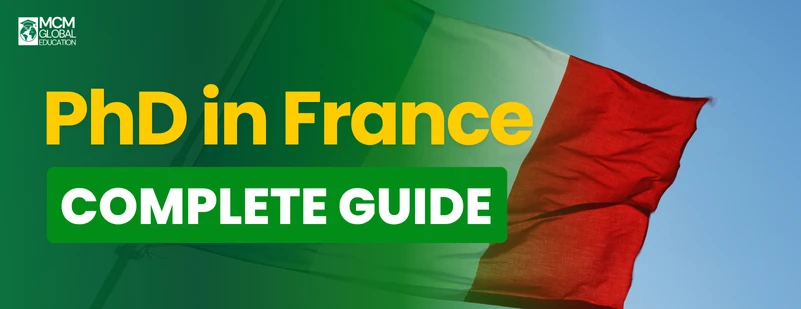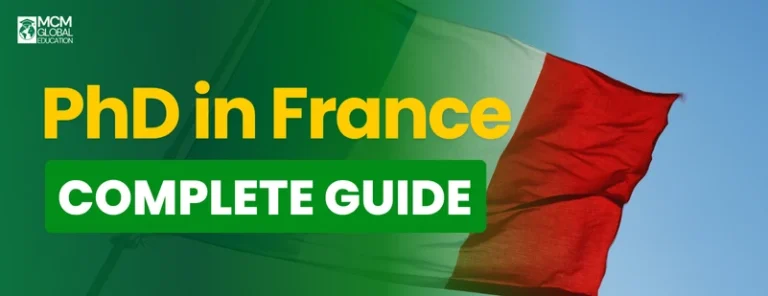Thinking of doing your PhD in France in 2025? You’re not alone. France is quickly emerging as one of the most sought-after destinations for international doctoral students — and for good reason. With its prestigious institutions, low tuition costs, strong research infrastructure, and attractive post-study work options, France checks all the right boxes for aspiring PhD scholars.
In this guide, we’ll walk you through everything you need to know about pursuing a PhD in France: from types of programs and application requirements to scholarship options, visa processes, and future career paths. Let’s dive in!
Table of Contents
Why Pursue a PhD in France?
| Feature | Why it Matters |
|---|---|
| Affordable Tuition | Public universities offer some of the lowest fees in Europe. |
| Globally Ranked Institutions | French universities consistently rank in the global top 100. |
| Multilingual Education | Many programs offered in English; French helps in day-to-day life. |
| Research Focused | Over 250 doctoral schools with strong funding and infrastructure. |
| Path to PR | Excellent immigration support and post-study work rights. |
France blends academic excellence with cultural immersion and practical benefits, making it an ideal choice for PhD aspirants.
Types of PhD Programs in France
1. Traditional PhD (Doctorate): 3-year full-time research program
2. Cotutelle de Thèse (Joint Supervision): Supervised by universities in France and another country
3. CIFRE Industrial PhD: Research work conducted in collaboration with a company
4. Professional Doctorates: Offered in fields like law, education, and business (rare in France)
Top Universities for PhD in France (2025)
| University | QS Global Rank 2025 | Areas of Excellence |
|---|---|---|
| Sorbonne University | Top 100 | Humanities, Physics, Math |
| École Normale Supérieure (ENS) | Top 50 | Philosophy, Biology, Physics |
| Université PSL | Top 50 | Social Sciences, AI, Literature |
| Université Paris-Saclay | Top 20 (STEM) | Engineering, Math, Biology |
| Aix-Marseille University | Top 200 | Law, Medicine, Political Science |
In-Demand PhD Specializations
- Artificial Intelligence & Machine Learning
- Sustainable Energy & Climate Science
- Biomedical & Genetic Research
- International Law & European Studies
- Fashion, Art, and Cultural Heritage
These domains are not only relevant to France’s national priorities but also globally competitive.
Eligibility Criteria
| Requirement | Details |
|---|---|
| Academic Qualification | Master’s degree in a relevant field |
| GPA | Usually 3.0/4.0 or equivalent |
| Language Proficiency | IELTS/TOEFL for English programs; DELF/DALF for French |
| Research Proposal | Essential for application approval |
| Supervisor Endorsement | Must connect with and get accepted by a supervisor |
Step-by-Step Application Process
- Choose your research topic and institution
- Find a potential supervisor or lab
- Develop and submit a research proposal
- Secure supervisor confirmation
- Apply through Campus France or university portal
- Attend interviews (if required)
- Receive offer letter and proceed with visa application
Documents Required
| Document | Required? |
|---|---|
| Academic Transcripts | Yes |
| CV with Research Experience | Yes |
| Statement of Purpose | Yes |
| Letters of Recommendation (2-3) | Yes |
| Research Proposal | Yes |
| Language Proficiency Score | Yes |
| Passport Copy | Yes |
Tuition Fees & Living Costs in France
| Expense | Cost (EUR/year) |
|---|---|
| Public University Tuition | €380 – €600 |
| Private University Tuition | €3,000 – €10,000 |
| Living Expenses (Paris) | €10,000 – €15,000 |
| Living Expenses (Other Cities) | €7,000 – €10,000 |
Note: Doctoral candidates often receive stipends or employment contracts that help cover these costs.
Scholarships and Funding Options
| Scholarship | Amount | Who Can Apply? |
|---|---|---|
| Eiffel Excellence Scholarship | €1,700/month | Non-EU international students |
| CIFRE Contract | Full salary | Industrial research PhD candidates |
| Erasmus+ Grant | €1,200+–€1,500/month | Exchange or joint-degree students |
| University PhD Contracts | €1,866/month | Domestic and international applicants |
| Campus France Scholarships | Varies | Country-specific funding programs |
Work Opportunities During & After PhD
| Stage | Work Rights |
|---|---|
| During PhD | 964 hours/year (part-time) |
| After PhD | APS visa for 1 year or Passeport Talent residence permit |
| Long-Term | PR eligibility after 5 years of legal stay (PhD included) |
You can also work as a research associate, university lecturer, or consultant right after graduation.
Career Prospects After PhD in France
| Role | Average Salary (EUR/year) |
|---|---|
| Postdoc Researcher | €35,000 – €45,000 |
| Academic Faculty | €45,000 – €60,000 |
| Corporate R&D | €50,000 – €80,000 |
| Data Scientist | €55,000 – €75,000 |
| Consultant/Analyst | €50,000 – €90,000 |
Student Visa Process (VLS-TS)
- Get your university acceptance letter
- Apply via Campus France portal
- Provide proof of financial support (~€7,000/year)
- Submit health insurance and accommodation documents
- Attend an interview at the French consulate
- Receive your VLS-TS long-stay student visa
Once in France, you must validate your visa online and get a residence permit (titre de séjour).
Is Learning French Necessary?
- Many PhD programs are in English, especially in STEM fields.
- Knowing basic French is recommended for living comfortably and expanding your job options.
- Free or subsidized French language classes available to students in France.
Top Cities for PhD Students in France
| City | Key Highlights |
|---|---|
| Paris | Leading universities, research hubs, cultural capital |
| Lyon | Strong in business, arts, and life sciences |
| Toulouse | Aerospace & engineering center |
| Grenoble | Known for tech and innovation |
| Montpellier | Affordable, vibrant student scene |
France vs Germany vs Canada: PhD Comparison
| Feature | France | Germany | Canada |
|---|---|---|---|
| Tuition Fees | Low | Free | Moderate |
| Living Cost | Medium | Medium | High |
| English Programs | Widely Available | Yes | Yes |
| PR Pathway | Strong | Moderate | Very Strong |
| Industrial PhD | CIFRE | Common | Rare |
Tips to Strengthen Your Application
- Contact supervisors early and personalize your communication
- Publish research papers during or after your master’s
- Tailor your SOP and proposal to university research interests
- Apply for multiple scholarships and funding sources
- Learn basic French in advance to boost your resume
FAQs: PhD in France
Q1. Can I do a PhD in France without knowing French?
Yes, many programs are offered in English. However, learning French helps in day-to-day life and job hunting.
Q2. Is PhD in France fully funded?
Most PhD students are funded through university contracts, CIFRE programs, or scholarships.
Q3. How long does a PhD take in France?
Typically 3 years, extendable by 1-2 years depending on your research and university.
Q4. Can I settle in France after PhD?
Yes. You can apply for the Passeport Talent or PR after graduation and work experience.
Q5. Is my French PhD recognized globally?
Absolutely! France is part of the Bologna Process, and its degrees are recognized worldwide.
Conclusion
Choosing to do your PhD in France could be one of the smartest decisions you make in 2025. With prestigious institutions, affordable tuition, and a solid post-study pathway, France is ideal for anyone serious about research and global opportunities. Plus, the cultural perks of living in France don’t hurt either!
If you’re ready to begin your PhD journey, take that first step today.























